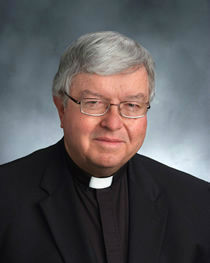
Faith
The deep and immediate anxiety that you experience upon entering the confessional might allow a priest to dispense you from what is known as the "integrity of confession."

Doyle
Q. I have always had a great fear of confession. Once I got in there, I would be so scared that I would just say the first thing I could think of, in order to get it over with. As a result, I have never really made a good confession in my entire life.
I am now 70 years old. I have asked God to forgive me, but I wonder if that's enough. Our parish is small; the priest knows everyone and that is part of the problem. But don't tell me to go to another church for confession, because that wouldn't help; I would still just clam up.
Can Jesus forgive me for this? I do try to be a good person and a good Catholic. (Des Moines, Iowa)
A. In the words of the Vatican's Congregation for Divine Worship and the Sacraments, the sacrament of penance "requires each penitent to confess to a priest all mortal sins ... after a diligent examination of conscience." The church's Code of Canon Law indicates that this integral confession of sins by number and kind constitutes "the only ordinary means by which a member of the faithful conscious of grave sin is reconciled with God and the church" (Canon 960).
But quickly, that same canon goes on to allow that "physical or moral impossibility" can excuse one from confession of this type. In their pastoral wisdom, confessors have typically applied this to someone with a very scrupulous conscience, for whom a detailed and comprehensive listing of sins would be so troubling as to be practically impossible.
I can see your own situation as being similar: The deep and immediate anxiety that you experience upon entering the confessional might allow a priest to dispense you from what is known as the "integrity of confession."
Why not visit with a priest you know and explain your situation? He might decide that it would be sufficient for you to indicate in a general way your sorrow for any sins and then receive absolution.
Yes, I understand that a certain sense of guilt and shame for sin is a normal and healthy part of penance, but the experience is meant fundamentally to be one in which the penitent can rejoice in the Lord's presence and relax in the assurance of his mercy.
The fact that this has not been so for you in the past tells me that a different approach is warranted, and the church's compassionate guidelines envision this.
Q. I am a regular reader of your column, and I have seen you recommend that people attend Mass at a different parish if some conflict or issue makes them feel uncomfortable at their local church. I wonder if you are aware of how hard it can be to do this and still have access to the church's "services."
Some dioceses are set up with rigid territorial boundaries and require you to join a certain parish based on your address. You aren't permitted to join another one without the permission of the pastor of your territorial parish.
If he won't grant permission -- which does occur-- and you don't support/attend your mandated parish, you are a "man without a country" when it comes to permission notes to be godparents or sponsors, to get married or have a child baptized, attend a Catholic school, even to arrange a funeral, etc.
My family has been caught in this loop, and moving is not a viable option. Any recommendations? (City of origin withheld)
A. Canonically, parishes are set up territorially (Canon 518). There is no canonical obligation to register formally in a particular parish, although this is helpful to a parish administratively and to a parishioner seeking needed permissions. Without doing a single further thing, you automatically belong to the parish where you live.
You are, of course, free to go to Mass wherever you want, and flexibility on this is a growing phenomenon in our nation of ever-increasing mobility. A Notre Dame study in the 1980s showed that 15 percent of American Catholics regularly attended Mass at a church other than their neighborhood parish, and that number has almost certainly grown since then.
It seems reasonable for Catholics to belong to a parish where they enjoy the liturgy, like the priest and feel comfortable with the parish community. Although I also see the wisdom of "belonging where you live;" human nature being what it is, there's a greater chance you will be involved in a parish's programs and activities if you live nearby.
Your territorial pastor does have certain jurisdiction over faith and sacramental life; a Catholic marriage, for example, must take place in the territorial parish of one of the Catholic parties or with that pastor's permission (Canons 1110 and 1111.1).
Theoretically, whether you can join a different parish is at the discretion of the local bishop, but very few are strict about this. In general, bishops (and pastors) are happy and grateful that someone wants to join any parish. So all you need to do is find a pastor willing to accept you, and I can guarantee you that there will be plenty.
- - -
Questions may be sent to Father Kenneth Doyle at askfatherdoyle@gmail.com and 40 Hopewell St., Albany, N.Y. 12208.
- Father Kenneth Doyle is a columnist for Catholic News Service
Recent articles in the Faith & Family section
-
Through to PentecostFather Robert M. O'Grady
-
Behold the ManArchbishop Richard G. Henning
-
Living a Life of GratitudeMaureen Crowley Heil
-
New morningScott Hahn
-
Easter and its datingMsgr. Liam Bergin























